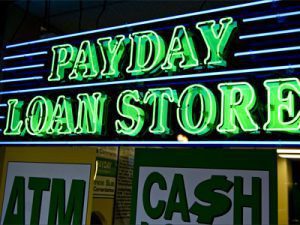Investment
Pew Study Finds Nevada, Idaho, and Utah Among Nation’s Highest Payday Loan Rates
 According to a new report, Idaho, Nevada and Utah have some of the country’s highest payday loan interest rates. The study, released by Pew Charitable Trusts, found rates in these states are so high because they are among just seven states that do not impose legal limits on payday loans.
According to a new report, Idaho, Nevada and Utah have some of the country’s highest payday loan interest rates. The study, released by Pew Charitable Trusts, found rates in these states are so high because they are among just seven states that do not impose legal limits on payday loans.
In Idaho, payday lenders charge an average of 582% annual interest on their loans, leading the country. Idaho is followed by South Dakota and Wisconsin (both 574%), Nevada (521%), Delaware (517%), and Utah (474%).
This news comes after a payday loan reform bill with no caps on interest rates passed the Idaho Legislature. The controversial bill was backed by payday lenders and opponents argue it did not go far enough to reform the industry. It was signed into law by Governor Butch Otter on March 26 and takes effect July 1. The law will limit borrowers taking out a payday loan to an amount that does not exceed 25% of their gross income while requiring lenders to offer borrowers who cannot repay their loans a once-a-year option for an extended payment plan with no additional fees.
Among the states with storefront payday loan providers, the lowest average annual interest is Colorado at 129%, the legal limit. Following Colorado is Oregon (156%) and Maine (217%).
Fifteen states in the country ban payday loans completely or cap interest rates at 36%. None of these states have storefront payday lenders.
The research found that when there is no limit on interest rates, competition does not lower rates much, if at all. The Pew study also found that the four largest payday lenders in the United States charge similar rates within any state, usually the maximum allowed. States with higher interest rate limits have more storefronts, but rates remain high.
The study urged states to limit payments to an affordable percentage of the borrower’s income and pointed out that monthly payments that exceed 5% of the borrower’s gross monthly income are not affordable.
According to Nick Bourke, project director for Pew, the average payday loan takes 36% of a borrower’s gross paycheck.
Last month, the Consumer Financial Protection Bureau issued a separate report on payday lending, finding that 4 out of 5 payday loans are rolled over or renewed within two weeks. This study found that 60% of payday loans are made to borrowers who renew their loans so often that the fees exceed the amount that was originally borrowed.
Only 15% of borrowers repay their payday loan when it is due without re-borrowing within two weeks, while 20% default at some point. The study also found that one out of 5 payday borrowers on monthly benefits — including elderly and disabled Americans receiving Social Security or Supplemental Security Income — are trapped in payday loan debt for the entire year.






